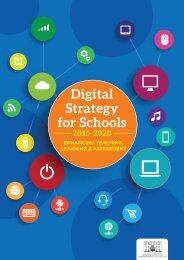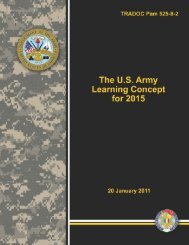Digital Strategy for Schools
TKmc0
TKmc0
Create successful ePaper yourself
Turn your PDF publications into a flip-book with our unique Google optimized e-Paper software.
DIGITAL STRATEGY FOR SCHOOLS – ENHANCING TEACHING, LEARNING & ASSESSMENT<br />
KEY THEMES<br />
The <strong>Strategy</strong> has been developed around four key themes which were identified from the Census<br />
Report.<br />
• Theme 1: Teaching, Learning and Assessment Using ICT<br />
• Theme 2: Teacher Professional Learning<br />
• Theme 3: Leadership, Research and Policy<br />
• Theme 4: ICT Infrastructure<br />
THEME 1: TEACHING, LEARNING AND ASSESSMENT USING ICT<br />
ICT can play a central role in trans<strong>for</strong>ming teaching, learning and assessment practices <strong>for</strong> teachers<br />
and students, in a high-quality 21st century education system. The Department recognises that<br />
teachers and schools are constantly engaged in enhancing how they teach, how their students learn<br />
and how learning is assessed. An essential part of this continuous improvement, in how we enable<br />
students to learn effectively, must be to further embed ICT into our education system at all levels.<br />
It is recognised internationally that meaningful ICT integration can be challenging to achieve and<br />
that schools need guidance and support to achieve it. All too often schools are not clear as to what<br />
ICT integration looks like and there<strong>for</strong>e are unsure how they can achieve it. The <strong>Strategy</strong> will provide<br />
advice and guidance <strong>for</strong> teachers and schools, including examples of good practice on the use of ICT<br />
<strong>for</strong> teaching. In addition, the Department will continue to include clear statements regarding digital<br />
skills and learning outcomes in new curricula throughout the lifetime of the <strong>Strategy</strong>.<br />
The <strong>Strategy</strong> will adapt the UNESCO ICT Competency Framework <strong>for</strong> Teachers so that schools will<br />
have greater clarity around the concept of ICT integration. The existing UNESCO Framework was<br />
developed <strong>for</strong> teachers around the globe and there is a need to localise it <strong>for</strong> the Irish context. By<br />
localising the UNESCO ICT Competency Framework <strong>for</strong> Teachers it will allow the Department’s<br />
support services and others to provide more appropriate support materials and services to principals<br />
and teachers on embedding ICT into their practice. This will be a central focus of the <strong>Strategy</strong> and<br />
it will be reviewed at various intervals and levels between 2015 and 2020.<br />
THEME 2: TEACHER PROFESSIONAL LEARNING<br />
Teachers, along with principals, will be instrumental in ensuring that ICT integration is achieved.<br />
There is a need to ensure that ALL teachers are equipped with the knowledge, skills and confidence<br />
to integrate ICT into their practice. The use of ICT <strong>for</strong> teaching, learning and assessment will be<br />
embedded at each stage of the continuum of teacher education, i.e. Initial Teacher Education,<br />
Induction and Continuous Professional Development. This will provide multiple opportunities <strong>for</strong><br />
teachers, across the continuum of teacher education, to become more knowledgeable and confident<br />
in achieving ICT integration. The Teaching Council’s policies on teacher education will recognise the<br />
role and potential of ICT to enhance teaching and learning in schools.<br />
The UNESCO ICT Competency Framework <strong>for</strong> Teachers will play a pivotal role in in<strong>for</strong>ming the<br />
design of all future teacher professional learning opportunities. The Department support services<br />
and others involved in teacher education will be encouraged to embed the use of ICT in CPD design,<br />
6




